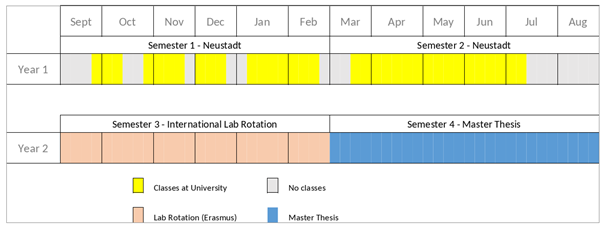The world of wine, ranging from business and industry to teaching and research, has a growing need for professionals with a scientific background and expertise in the wine and beverage sector. It is also important to understand how to navigate the special relationship between the German and French wine markets.
The English-language Master of Science in Viticulture and Enology is aimed at Bachelor graduates who wish to qualify for management positions in the international wine industry. The practice-oriented course lasts 4 semesters. Innovative course content such as environmental protection, climate change, resource conservation, digitalization, competitiveness and sustainability are addressed. Adaptation strategies to EU requirements, such as reducing the use of pesticides, are also part of the curriculum. The course content is taught through practical projects, lectures and interactive workshops with industry experts and international guest lecturers.
For Bachelor's graduates with no previous knowledge of viticulture and oenology, basic modules lasting several weeks are offered at the beginning of the first semester. The third semester takes place in another European country, preferably in France. In the fourth semester, the Master's thesis is written at the university or in a company in Germany or abroad.
No tuition fees are charged.
You already have a Bachelor's degree in Viticulture and Enology?
Since the winter semester 2024/2025, the Weincampus Neustadt has been offering the career-integrated Master of Science in Viticulture & Enology in cooperation with the Université de Haute-Alsace in Colmar (France). The English-language course is aimed at Bachelor's graduates with a background in viticulture and enology who wish to combine their studies with a career and qualify for management positions in the international wine industry.
Overview
- Degree: Master of Science in Viticulture & Enology (M.Sc.)
- Standard period of study: 4 semesters
- Locations: Neustadt an der Weinstraße, Germany (3 semesters), 1 semester abroad, preferably in France
- Language of instruction: English
- Program start: Winter semester
- Admissions requirements: Bachelor's degree in natural science, agricultural science, engineering or economics with a focus on the wine industry, English language skills (minimum B2 level)
- Financing: No tuition fees, scholarships
- Application deadline: August15th
Timetable



